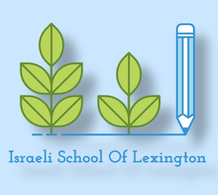Our Curriculum
The Israeli School of Lexington is a unique innovative school that combines 2 major aspects in its core:
Theme Based Community of Learners: though our lesson plans is modified to each classroom, its content (theme) is identical across all ages and levels. every week all students will learn and improve their set of academic skills while being exposed to the very same topic and values (family, nature, holidays etc.).
Multi-Age Classrooms to help meet the unique needs and academic goals of each learner: Our school is currently set up with four multi-age classroom configurations:
Pre-K - Kindergarten (age 4-5)
1st-2nd grade (age 6-7)
3rd-4th grade (age 8-9)
5th-6th grade (age 10-11)
As learners have strengths in some areas, and challenges in others, multi-age classrooms provide a wider range of resources, such as peers, and learning centers. These resources offer a better fit than those normally found in more traditional, single-grade classrooms.
At The Israeli School of Lexington Multi-age classrooms also enable improvement in both teaching and learning:
Combining students in multiple grades allows students the ability to move faster or slower in individual subjects. It also enables improved learning opportunities like spiraled curriculum and peer-to-peer learning, among others.
Since teachers work in content teams across grade levels they have access to more resources to meet the differentiated needs of each student.
Combining grade levels also enables The Israeli School of Lexington to improve its instructional practices through specialized professional development and cross-curricular planning.
Academic Skills
Pre-K - Kindergarten (ages 4-5):
Developing a clear and fluent self-expression ability through the use of the vocabulary learned.
Expanding the repertoire of songs, rhymes and Israeli stories and becoming familiar with popular Israeli writers and poets.
Identifying, reading and writing the Hebrew alphabet letters and some of the vowels, and being able to read the first words (“Ima”, “Aba”, “Shalom”, etc.) by the end of the year.
Increasing familiarity with the culture and the Israeli and Jewish tradition, knowledge of customs, songs and stories related to Jewish holidays and Israeli events and exposure to the historical stories (at a general level) that lie behind the holidays.
First-Second Grade (ages 6-7):
Expansion of oral expression capability using the vocabulary learned.
Developing a description, explanation and a simple comparison abilities.
Learning the combinations of letters and vowels accurately.
Developing the ability to read short sentences and short stories.
Printing correctly and clearly while keeping the intervals between words.
Dealing with structured tasks such as answering a simple question, completing the word in a sentence and the like.
Reading a section and a short story accurately and fluently.
Identifying a central passage and answering comprehension questions.
Knowledge of various genres such as story book, Poem book, advertisement, short interview, a short story, and so on.
Learning to write in script.
Dealing with structured tasks such as writing a few sentences or a short section in accordance with ability.
Enhancing the knowledge of Jewish holidays, traditions and Jewish and Israeli culture at the level of basic concepts and the simple historical stories.
Study of the major Bible stories of “Bereshit” and the ability to read from the textbook.
General familiarity with the map of Israel and central places and sites in Israel.
Third-Fourth Grade (ages 8-9):
Emphasis on improving reading fluency and accuracy – precise readings as a combination of letters and vowels and regular reading of texts and short stories.
Text analysis and comprehension improvement – identifying a central idea in the text and drawing conclusions after reading the text.
Exposure to different styles in literature: short story, poem book, a parable, legend, poetry, posters, comics.
Implementation process of writing in script, while dividing the alphabet to groups and consistent practice.
Learning structured and open writing.
Expanding the vocabulary by using synonyms, linguistic enrichment – Male – Female, single – plural, antonyms, word pairs, rhyming words, roots, diverting time, distinguishing between types of sentences, punctuation (quotation marks, question mark / reading, colon), confusion of words, Word games (he and She), phrases and meanings, and so on.
Expanding and deepening the knowledge of Jewish holidays and traditions, recognizing the historical narratives, customs, songs, stories and related legends.
Fifth-Sixth Grade (ages 10-11):
Developing description, explanation, comparison and expression skills, using complex sentences while maintaining the language rules.
Expanding the repertoire of Israeli songs and stories along with the capability to describe and retell them.
Accurate and fluent reading of one-page or more stories, while monitoring the punctuation and correct intonation when reading.
Expanding familiarity with different types of literature such as a poem book, advertisement, short interview, short story and beginning to read children’s newspapers and magazines.
Developing the ability to write a short story, interview and informative text.
Enhancing knowledge of Jewish holidays, traditions and Jewish and Israeli culture and the ability to summarize the value or central idea of a holiday and to express a personal opinion.
Link between the stories of the Torah to the Jewish tradition, and familiarity with basic concepts of Judaism.
Expansion of the literary repertoire – going deeper into philosophical parables and a unique book that accompanies the class throughout the year. Analyzing poetry, short story, a parable, a recitation, a novel, a popular story, diary, idioms and proverbs.
Practice linguistic issues and languaging – slang, every day speech, the effects of other languages, Eliezer Ben-Yehuda and his inventions, the language of the Bible and midrash.
Deepening the knowledge of Israeli tradition and Jewish holidays – Familiarity with the historical stories, the development of icons, holiday customs and more.
